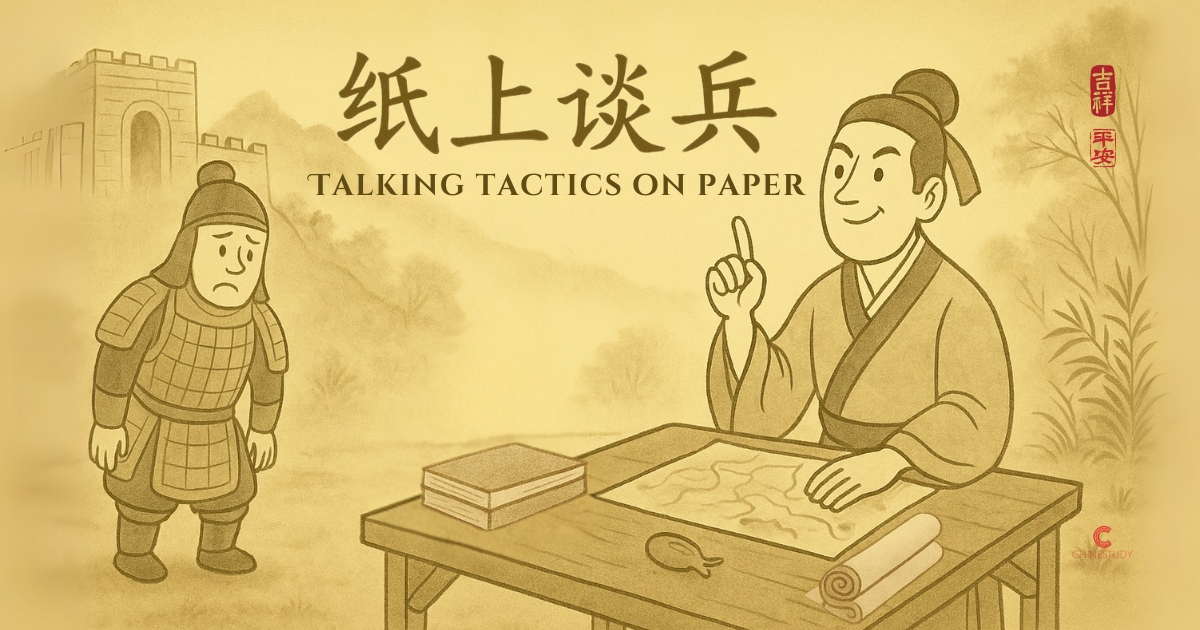📜 纸上谈兵 zhǐ shàng tán bīng – Talking Tactics on Paper

🔍 What It Means
纸上谈兵 (zhǐ shàng tán bīng) literally means “discussing military strategy on paper.”
Word-for-word:
- 纸 (zhǐ) – paper
- 上 (shàng) – on
- 谈 (tán) – to talk
- 兵 (bīng) – soldiers, war, military
It describes someone who talks theory but lacks real-world experience, especially when their advice sounds smart but doesn’t work in practice.
In English, it’s like saying:
- 📄 “All talk, no action”
- 🧠 “Armchair general”
- 🤔 “It works in theory…”
🏺 Where It Comes From
This idiom comes from a story during the Warring States period.
Zhao Kuo was the son of a famous general.
He studied war books, knew every strategy by heart, and loved to talk about military theory.
On paper, he was brilliant.
One day, his country put him in charge of a real army.
But on the battlefield, he made big mistakes.
He followed theory — not real-life judgment.
The enemy surrounded his army.
Over 400,000 soldiers were lost.
Zhao Kuo died in battle.
That became a metaphor:
Talking about strategy is easy — but without experience, it can lead to disaster.
💬 How to Use It
Use 纸上谈兵 when someone talks a lot about ideas or theory — but can’t put them into action.
- ✅ Common in work, study, leadership, or criticism
- ✅ Can be used seriously or jokingly
🎯 Real Examples
1. 他虽然读了很多书,可是做事总是纸上谈兵,难怪项目失败了。
- Tā suīrán dú le hěn duō shū, kěshì zuòshì zǒng shì zhǐshàngtánbīng, nánguài xiàngmù shībài le.
- 👉 He’s read so many books, but it’s all theory — no wonder the project failed.
2. 你别只会纸上谈兵,来试试看实际操作吧!
- Nǐ bié zhǐ huì zhǐshàngtánbīng, lái shìshikàn shíjì cāozuò ba!
- 👉 Don’t just talk — try it yourself and see how it really works!
⚠️ Common Mistakes (Watch Out!)
❌ Mistake: Using this idiom for someone with a lot of practice
✅ Correct: It describes someone who knows theory but lacks action or real-world skill
❌ Mistake: Thinking it means “writing military reports”
✅ Correct: It’s talking about war without knowing how to fight one
💡 Memory Tip

Picture a proud scholar sitting with books and maps.
He talks all day about how to win battles.
But when the war begins…
He doesn’t know what to do.
That’s 纸上谈兵 — when ideas sound good on paper, but don’t survive the real world.
🧩 Interactive Practice
Translate this sentence into English:
- 他总是纸上谈兵,根本不知道怎么实际解决问题。
Answer:
He always talks theory and has no idea how to solve real problems.
🌟 Final Thoughts
纸上谈兵 reminds us that knowledge without experience is fragile.
It’s easy to talk — but real skill comes from doing.
☝️ Ask yourself: Is that just theory — or something you’ve truly tested?
👉 Stay tuned for the next idiom in this series!
Thank you for subscribing!
Have a great day!